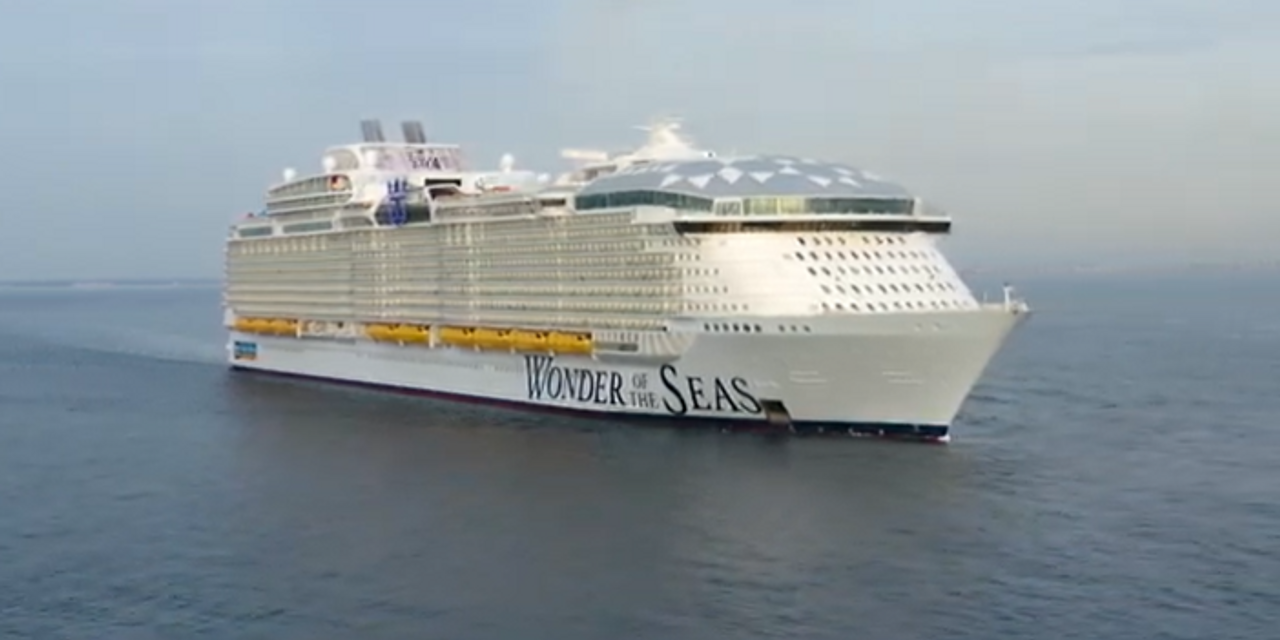Shares of Royal Caribbean Group rallied Thursday, after the cruise operator’s second-quarter results beat expectations, and provided an upbeat assessment of guest activity onboard its ships and for future cruises.
The company also said it is seeing signs that inflation, in one of the areas most susceptible to rising prices — food — is peaking, which should help boost margins for the rest of this year and into next year.
The net loss for the quarter to June 30 was $521.6 million, or $2.05 share, less than half the loss of $1.35 billion, or $5.29 a share, recorded in the same period a year ago. Excluding nonrecurring items, the adjusted per-share loss of $2.08 beat the FactSet loss consensus of $2.20.
Revenue soared 43-fold, to $2.18 billion from $50.9 million to top expectations of $2.11 billion, as load factors reached 82% overall, including nearly 90% in the month of June.
And operating cash flow turned positive, to approximately $500 million.
The stock
RCL,
shot up 6.7% in midday trading Thursday. That puts the stock on track for the best one-day, post-earnings performance since it ran up 9.3% on Feb. 22, after fourth-quarter 2020 results.
Chief Executive Jason Liberty said on the post-earnings conference call with analysts that guests on the company’s cruise ships, which currently total 125,000, are spending at least 30% more “across all categories” than they did in pre-pandemic 2019.
“The spending trends have been consistent across our customer base, even as we were approaching full load factors,” Liberty said, according to a FactSet transcript.
He added that bookings for 2022 sailings have averaged about 30% above 2019 levels throughout the second quarter, “and more recently have been up to 35%.”
While the second half of 2022 is booked below historical ranges, the bookings are at higher prices than 2019. For 2023, Liberty said that all four quarters are booked within historical ranges “at record prices,” with bookings accelerating every week.
Meanwhile, cruise operating expenses have also soared along with revenue as more ships sail. Total operating expenses quadrupled, to $1.69 billion from $424.8 million. That included a 9-fold jump in food expenses to $155.2 million and a near 5-fold rise in fuel costs to $275.2 million.
Liberty said that while food and fuel are the main categories that are susceptible to inflation, “there are some initial positive signs” with respect to inflation trends for food.
“Our most recent month-over-month [food and beverage] inflation indicator has increased at the slowest pace thus far in 2022,” Liberty said. “This, combined with direct conversations with our key suppliers, indicate inflation levels are peaking, so we should start seeing some relief in the coming months.”
Regarding fuel, Liberty said the company continued to “optimize” consumption and has partially hedged its costs to below market prices.
Read MarketWatch’s “Economic Report” column for more on inflation.
He said the company is started to see the benefits of peaking food inflation and its fuel-cost measures, as well as other actions taken to reduce other expenses.
“[W]e have taken and continue to take numerous actions to reshape the cost structure of the business to support growing margins as we execute on our recovery,” Liberty said. “We also expect the growth in margins to accelerate in the second half and into 2023,” he added.
The company also provided financial guidance for the first time since the first quarter of 2020.
Based on current currency exchange rates, fuel prices and interest rates, the company expects third-quarter adjusted earnings per share of 5 cents to 25 cents and revenue of $2.9 billion to $3.0 billion. This compares with the current FactSet consensus for EPS of 82 cents and for revenue of $3.03 billion.
Fuel expenses are expected to be $319 million, at an average pricing of $794 per metric ton, which compares with $721 per metric ton in the second quarter.
In summary, Liberty said the company reached two important milestones in its recovery in the second quarter, returning the entire fleet to operations and delivering positive operating cash flow.
“Consumers’ propensity to travel and cruise remains strong. We continue to see a robust and accelerating demand environment for cruising and onboard spend,” Liberty said. “Cruising remains a very attractive value proposition for vacationers, and today we have an opportunity to further close the value gap to other land-based vacation offerings.”
The company said that as of Aug. 8, it will only require COVID-19 testing for unvaccinated guests on all voyages, and for vaccinated guests on voyages that are six nights or longer.
Royal Caribbean’s stock has tumbled 51.6% year to date, while shares of rival Carnival Corp.
CCL,
CCL,
have tumbled 55.6% and Norwegian Cruise Line Holdings Ltd.
NCLH,
have dropped 43.1%. In comparison, the S&P 500 index
SPX,
has lost 15.0% this year.
